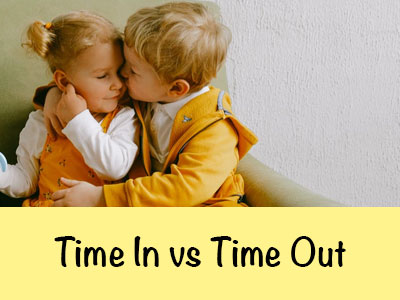Introduction of Time In over Time Out for Toddlers
A new trend for toddler discipline is “Time In’. But what is Time In, how does it differ from Time Outs, and when does it work best? As always every child and every situation is different. Today we at Kinder Buddies discuss how and when to incorporate Time Ins with your Toddler.
What is Time In vs Time Out?
Toddlers are so new to everything from situations to big feelings. While in the past time outs have been seen as a useful parenting method, people are questioning it now. Time outs are difficult, as we don’t give toddlers the tools they need to deal with these big scary emotions they are feeling. We leave them alone.
Time In is where an adult sits with their Toddler until they calm down. You communicate what they have done wrong and why it was wrong. While you may think your toddler should know something is wrong, they are impulsive by no fault of their own. Children do well with consistency and reminders.
Time in isn’t a punishment or consequence either! After you have discussed what they did wrong and why it was wrong, ask your toddler whats a good punishment could be.
Example of a Time In
- Your toddler is throwing their blocks across the room.
- You have asked them stop or you will take away the toys, but they continue
- You tell them that since they don’t want to play nicely you are putting the blocks away
- Your toddler may naturally be upset and cause a fuss
- Kneel down to go down to your toddlers level to talk to them
When communicating, you want to allow your child to answer the questions before answering for them. Show that you’re listening to them. If they don’t have the right answers, you can calmly explain your reasoning. Some important questions to ask:
- “How are you feeling? Why do you feel that way?”
- “Why did I put away the blocks?”
- “Why do we not throw blocks? What could happen?”
- “How can we make sure you don’t throw blocks inside in the future?”
- “Since you wouldn’t play with the blocks nicely when I asked, what punishment makes sense?”
We always recommend consequences that match the bad behavior. For example with throwing blocks, it may make sense to put the blocks away until tomorrow.
When to do Time In?
Time Ins work best when you can see your little one is very overwhelmed with emotion. They may not understand WHY they are upset themselves, things may not make sense to them.
Another great moment to use Time Outs is when you can already tell your child knows they did something wrong. They already feel bad so it makes sense to reiterate why the behaviour is unacceptable.
Perfecting the Time In
Stay Calm: You may feel annoyed, disappointed, or angry but it’s important to remain calm. When you remain calm you show your toddler that you’re still in control and they can feel safe with you.
Actively Listen: When you are talking with your child take them seriously. Nod your head, acknowledge how they are feeling. If your child believes they can trust you to listen, they may be more likely to come to you before acting out in the future.
State all the Facts: While not throwing blocks doesn’t make sense to you, your toddler may be trying to do some sort of pretend play. It might make sense to them. They throw toys outside why not inside? Make sure you are specific about: What behaviour you expect, why you expect that level of behaviour
When to do Time Outs?
You will know your child best and some kids may act out in order to get Time In attention. While toddlers very rarely know how to manipulate their parents on purpose; if Time Ins aren’t working it may be time to go back to Time Outs.
Having Better Time Outs
While you can go back to Time Outs when you need it, there are ways to having more productive time outs. Make sure your child knows why they have time out, and give them a tool to deal with their emotions alone.
If they are angry suggest they take their favorite stuffy to talk it out. Consider asking them to do a calm activity they enjoy like colouring. Send them to their room and put on some music.
Some extra tips for the best time outs:
Time Outs are not a punishment or consequence: they are a time for your child to calm down and understand the situation.
Don’t use time limits: kids don’t really understand the concept of time. Tell your child to stay until they have calmed down.
Be Consistent: Set up a typical Time Out routine that works for your toddler. They may even naturally put themselves in “time out” when they are overwhelmed.
Kinder Buddies Oakville Child Care is a Quality First Daycare and Infant Care facility in Oakville, Ontario. We take care of children from the age of 6 weeks to 5 1/2 providing nutritious meals and fun activities all day long.


 Previous Post
Previous Post Next Post
Next Post